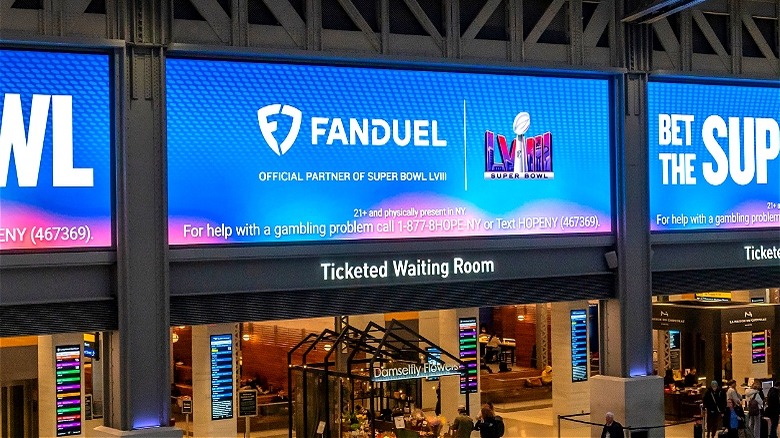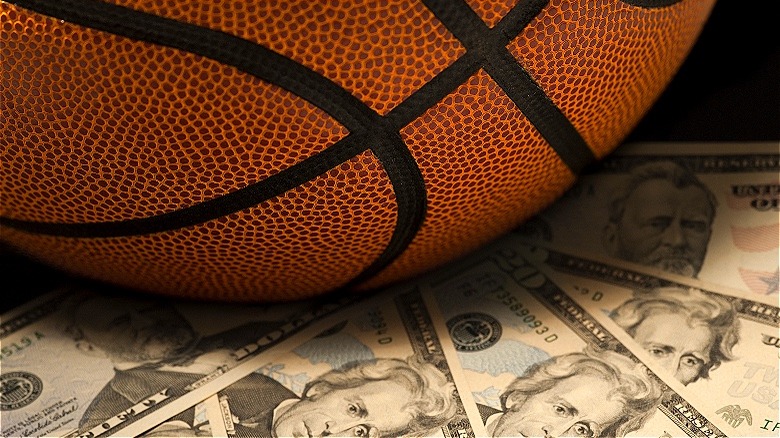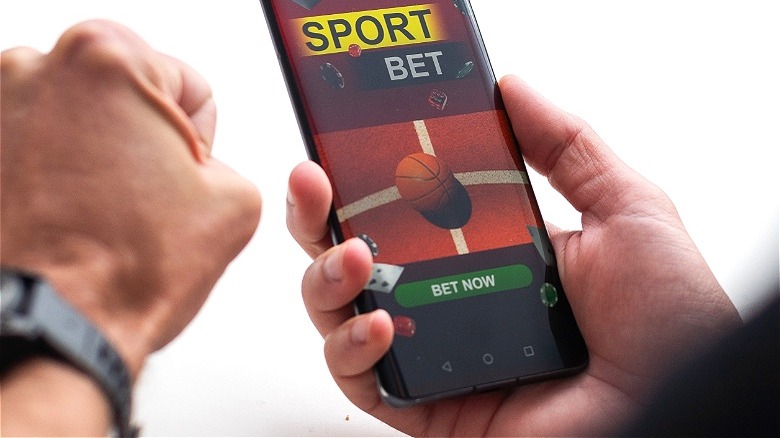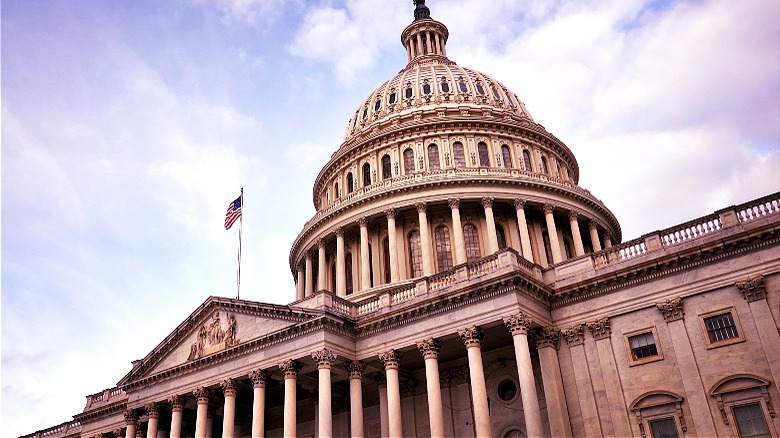The Dark Side Of Sports Betting You Should Know
Since the Supreme Court's 2018 decision to strike down the previously long-held Professional and Amateur Sports Protection Act (PAPSA), sports betting in the United States has been on the rise. In fact, per data from the American Gaming Association's Commercial Gaming Revenue Tracker, fans wagered $119.84 billion on sports betting in 2023 — a 27.5% increase over 2022. As of May 2024, commercial gaming industry revenue was 9.4% higher than the same time in 2023, marking the 39th consecutive month of annual growth for the U.S. gambling industry. All of this is to say that sports betting is an extremely lucrative industry that's more than likely not going anywhere anytime soon.
While certain states have held out on legalization, the states that have legalized sports betting are experiencing significant revenues. However, alongside gambling industry claims of job creation and economic growth are the downsides to consider. From a rise in problem gambling and addiction to the lack of federal oversight over gambling advertisements and promotions, the legalization of sports gambling has led to serious consequences for thousands of would-be bettors in the country. Despite some minor attempts to improve funding for addiction resources, on the whole, the U.S. gambling industry is more than happy with its current status (and, above all, profitability), regardless of the negative consequences for its users. Let's dive into some of the most significant downsides of the growing sports betting industry.
Gambling disorders
First and foremost, there's been an astonishingly high increase in calls to gambling hotlines across the country since sports betting legalization has spread to more states. According to the National Council on Problem Gambling (NCPG), calls to the National Problem Gambling Helpline increased by 43% in 2021, while texts increased by 59.8% and online chat volume increased by 84.1%. The NCPG estimates that 2.5 million U.S. adults (roughly, 1% of the population) meet the criteria for a severe gambling problem, while 5-8 million (~2% to 3% of the population) are considered to have mild to moderate gambling problems. Also concerning is the estimate that problem gambling leads to $14 billion in social costs due to job loss, bankruptcy, gambling-related criminal justice, health care spending, among other reasons.
What's also troubling about the growing prevalence of gambling addiction is just how severely it affects young people, particularly men. Young adults (under age 24) are especially vulnerable to the addictive nature of gambling while those with lower socioeconomic status tend to face higher rates of problem gambling. Forbes reports many statewide surveys have shown increased numbers in both the incidence and prevalence of gambling disorders since 2018, with almost every state seeing an increase in demand for problem gambling treatment services. To make matters worse, according to research published in the journal Addiction by the Society for the Study of Addiction, as many as 90% of people with gambling problems never seek help.
Promotions and incentives
One of the most troubling elements of sports betting today, especially when it comes to apps, is the inclusion of special promotions and incentives, which can exacerbate addiction tendencies (see our guide on the biggest mistakes new users make on betting apps). Promotions like sign-up or referral bonuses, bonus bets, and promotion codes can add to the illusion of gambling being more risk-free. One study, in particular, in the Journal of Behavioral Addictions, found that "risk-free" bet language had the highest impact on bettors. A prime example of this kind of betting incentive would be Rob Gronkowsi's live Super Bowl halftime field goal kick for FanDuel, in which any customer with a $5 (or more) bet was promised a share of $10 million "free bets" if he made the kick, dubbed the Kick of Destiny (he failed in both his 2024 and 2023 attempts).
In February 2023, both Barstool Sportsbook and DraftKings agreed to pay $750,000 in fines after being sued by the Ohio Casino Control Commission. Part of the OCCC's complaint stemmed from the advertising of promotions with "free" and/or "risk-free" bets and bonuses, which they argued was false since users had to risk their own money in order to participate. Barstool Sportsbook (rebranded as ESPN Bet in November 2023) ended up paying for advertising on or near a college campus and targeting customers who were under 21, and therefore not legally able to gamble in the state of Ohio. DraftKings also paid for several infractions, including mailing advertisements to people under 21, not including messaging about problem gambling, and advertising "free" or "risk-free" bets.
Lack of oversight
A concerning element of sports betting is the lack of federal oversight regulating the industry. As well, unlike existing federal funds dedicated to alcohol, tobacco, and drug addiction programs, there is currently no federal fund for problem gambling treatment. John Holden, an associate professor studying sports gambling regulation at Oklahoma State University, explained to CNN, "Many states naively or some other way went about legalizing sports betting without adequately estimating the costs on problem gambling resources." While some states have a more keen interest in protecting consumers than others, the lack of overall consumer protections in many states allows for a great deal of problematic advertising in the sports betting industry.
Another concern for regulators is rooted in First Amendment protections for commercial speech. Explained Holden, "A lot of state regulators have big First Amendment fears. No one wants to fund litigation or lose a Supreme Court case over gambling," leaving many regulators unwilling to tighten their restrictions or attempt to challenge sports betting companies over advertisement messaging.
Unfortunately, without more funding to specifically go after the companies violating false and/or misleading advertising rules, it's unlikely many of the large sports betting companies will change their existing strategies. Worst of all, this unregulated environment hurts would-be bettors the most while normalizing and even glamorizing sports betting for kids. Despite the fact that sports betting is restricted to those who are over 21 in most states, television, radio, and in-stadium advertisements reach thousands of kids and teenagers across the country.
App play
There are several features of modern sports betting that make it fundamentally different than other forms of gambling. These differences can add to the especially addictive nature of sports betting, and nowhere is this more true than with smartphone apps. A study published in the European Addiction Research journal found that smartphone gambling apps were substantially more dangerous for those with addiction tendencies than more traditional terminals like slot machines. Per the study, gambling apps led to a higher level of persistence in the face of losses, which meant users were more likely to lose more money. This was due to a combination of the more video-game-like gameplay inherent in most gambling apps as well as the fact most people check their phones fairly regularly throughout the day. This frequent phone checking led users to make much more frequent bets.
It's also worth mentioning the algorithms used in mobile gaming apps are specifically designed to encourage more engagement through a strategically selected mix of small wins, new misses, and losses. In fact, the executive director of the National Council on Problem Gambling, Keith Whyte, explained just how dangerous mobile gambling is to CBS Austin's Spotlight on America, "Driven by A.I. and delivered directly to your phone, in some cases, it may be impossible to resist. You know, it's the perfect bet at the perfect time, every couple minutes." This highly addictive new method of gambling can create emotional, financial, and even physical harm to gamblers and their families.
The future of US sports betting
According to the American Gaming Association's annual report, sports betting earned a whopping $10.92 billion in revenue in 2023, with states like New York and Illinois raking in the most revenue (if you're surprised by those states, remember that not all states allow sports betting today). In fact, commercial U.S. sports betting revenue has increased 12-fold since 2019, with no signs of slowing down. This means the chances of putting the sports gambling genie back in the bottle are slim, even as some sports betting fans increasingly feel entitled to certain outcomes and news stories surface of players betting on themselves (specifically, prop bets). All this is on top of the thousands of bettors dealing with problem gambling and addiction consequences despite a lack of funding for recovery and treatment programs.
In January 2024, the Gambling addiction Recovery, Investment, and Treatment Act (GRIT) was introduced to Congress. The bill would require 50% of the federal sports excise tax revenue earned to be set aside to fund gambling addiction prevention, treatment, and research programs. While the legislation might sound promising, it's ultimately an unpopular one due to the fact that, across the aisle, politicians generally value the state income earned from legalized sports betting. Most of them would be unwilling to lose the additional tax revenue earned from legalized gambling by funding treatment programs, regardless of how necessary they might be.





